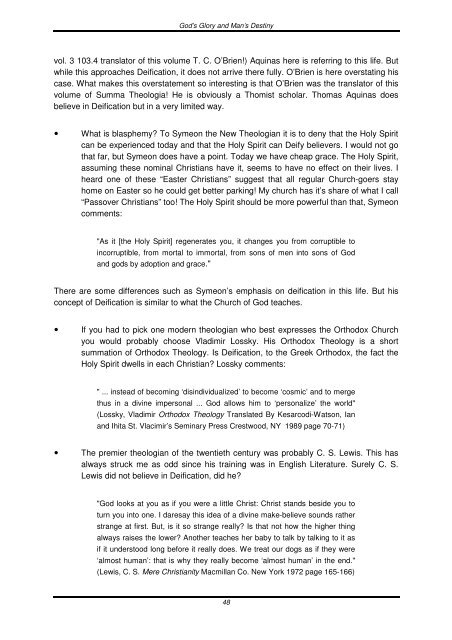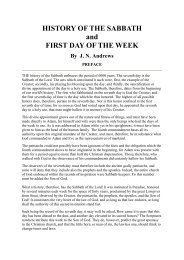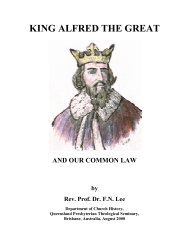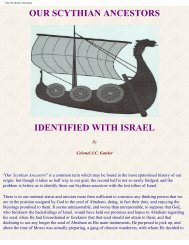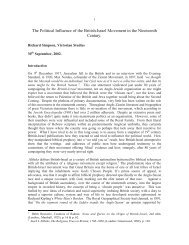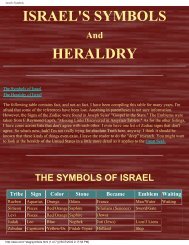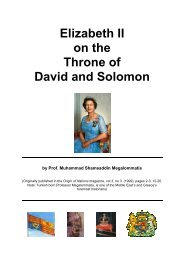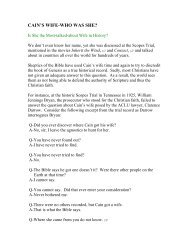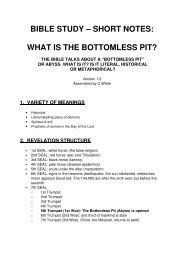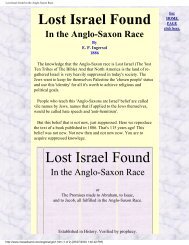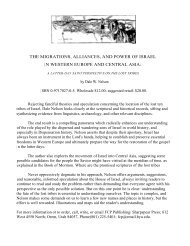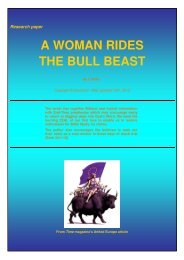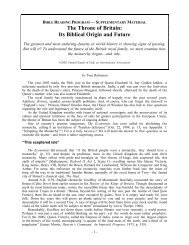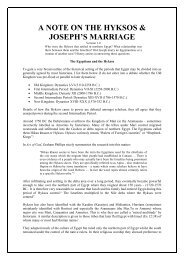Bible study By C M White - Origin of Nations
Bible study By C M White - Origin of Nations
Bible study By C M White - Origin of Nations
Create successful ePaper yourself
Turn your PDF publications into a flip-book with our unique Google optimized e-Paper software.
God’s Glory and Man’s Destiny<br />
vol. 3 103.4 translator <strong>of</strong> this volume T. C. O’Brien!) Aquinas here is referring to this life. But<br />
while this approaches Deification, it does not arrive there fully. O’Brien is here overstating his<br />
case. What makes this overstatement so interesting is that O’Brien was the translator <strong>of</strong> this<br />
volume <strong>of</strong> Summa Theologia! He is obviously a Thomist scholar. Thomas Aquinas does<br />
believe in Deification but in a very limited way.<br />
<br />
What is blasphemy? To Symeon the New Theologian it is to deny that the Holy Spirit<br />
can be experienced today and that the Holy Spirit can Deify believers. I would not go<br />
that far, but Symeon does have a point. Today we have cheap grace. The Holy Spirit,<br />
assuming these nominal Christians have it, seems to have no effect on their lives. I<br />
heard one <strong>of</strong> these “Easter Christians” suggest that all regular Church-goers stay<br />
home on Easter so he could get better parking! My church has it’s share <strong>of</strong> what I call<br />
“Passover Christians” too! The Holy Spirit should be more powerful than that, Symeon<br />
comments:<br />
"As it [the Holy Spirit] regenerates you, it changes you from corruptible to<br />
incorruptible, from mortal to immortal, from sons <strong>of</strong> men into sons <strong>of</strong> God<br />
and gods by adoption and grace."<br />
There are some differences such as Symeon’s emphasis on deification in this life. But his<br />
concept <strong>of</strong> Deification is similar to what the Church <strong>of</strong> God teaches.<br />
<br />
If you had to pick one modern theologian who best expresses the Orthodox Church<br />
you would probably choose Vladimir Lossky. His Orthodox Theology is a short<br />
summation <strong>of</strong> Orthodox Theology. Is Deification, to the Greek Orthodox, the fact the<br />
Holy Spirit dwells in each Christian? Lossky comments:<br />
" ... instead <strong>of</strong> becoming ‘disindividualized’ to become ‘cosmic’ and to merge<br />
thus in a divine impersonal ... God allows him to ‘personalize’ the world"<br />
(Lossky, Vladimir Orthodox Theology Translated <strong>By</strong> Kesarcodi-Watson, Ian<br />
and Ihita St. Vlacimir’s Seminary Press Crestwood, NY 1989 page 70-71)<br />
<br />
The premier theologian <strong>of</strong> the twentieth century was probably C. S. Lewis. This has<br />
always struck me as odd since his training was in English Literature. Surely C. S.<br />
Lewis did not believe in Deification, did he?<br />
"God looks at you as if you were a little Christ: Christ stands beside you to<br />
turn you into one. I daresay this idea <strong>of</strong> a divine make-believe sounds rather<br />
strange at first. But, is it so strange really? Is that not how the higher thing<br />
always raises the lower? Another teaches her baby to talk by talking to it as<br />
if it understood long before it really does. We treat our dogs as if they were<br />
‘almost human’: that is why they really become ‘almost human’ in the end."<br />
(Lewis, C. S. Mere Christianity Macmillan Co. New York 1972 page 165-166)<br />
48


